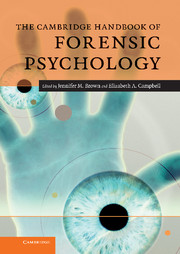Book contents
- The Cambridge Handbook of Forensic Psychology
- The Cambridge Handbook of Forensic Psychology
- Copyright page
- Dedication
- Contents
- Figures
- Tables
- Contributors
- Acknowledgements
- Forensic psychology:
- Part I Psychological underpinnings
- Part II Assessments
- Part III Interventions
- Part IV Psychology and criminal behaviour
- Part V Psychology and civil law
- Part VI Special topics
- 6.1 Arson
- 6.2 Bullying among prisoners
- 6.3 Child soldiers
- 6.4 Crime prevention
- 6.5 Guns and shootings
- 6.6 Hostage taking:
- 6.7 Hypnosis
- 6.8 Jury decision making
- 6.9 Malingering:
- 6.10 Munchausen by proxy
- 6.11 Occupational culture
- 6.12 Occupational stress in police and prison staff
- 6.13 Sexual harassment
- 6.14 Undercover policing and psychological stress
- 6.15 Victimology
- 6.16 Young children presenting with sudden infant death syndrome or apparent life-threatening events
- Part VII Professional practice
- Part VIII Research practice
- Author index
- Subject index
6.15 - Victimology
from Part VI - Special topics
Published online by Cambridge University Press: 06 July 2010
- The Cambridge Handbook of Forensic Psychology
- The Cambridge Handbook of Forensic Psychology
- Copyright page
- Dedication
- Contents
- Figures
- Tables
- Contributors
- Acknowledgements
- Forensic psychology:
- Part I Psychological underpinnings
- Part II Assessments
- Part III Interventions
- Part IV Psychology and criminal behaviour
- Part V Psychology and civil law
- Part VI Special topics
- 6.1 Arson
- 6.2 Bullying among prisoners
- 6.3 Child soldiers
- 6.4 Crime prevention
- 6.5 Guns and shootings
- 6.6 Hostage taking:
- 6.7 Hypnosis
- 6.8 Jury decision making
- 6.9 Malingering:
- 6.10 Munchausen by proxy
- 6.11 Occupational culture
- 6.12 Occupational stress in police and prison staff
- 6.13 Sexual harassment
- 6.14 Undercover policing and psychological stress
- 6.15 Victimology
- 6.16 Young children presenting with sudden infant death syndrome or apparent life-threatening events
- Part VII Professional practice
- Part VIII Research practice
- Author index
- Subject index
Summary
- Type
- Chapter
- Information
- The Cambridge Handbook of Forensic Psychology , pp. 732 - 738Publisher: Cambridge University PressPrint publication year: 2010



